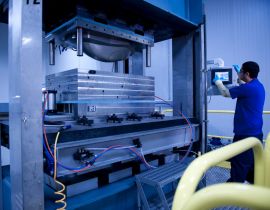 Today, the ‘European Thermoplastic Automotive Composites’ (eTAC) consortium commenced with the launch of the website http://www.etac.info. This collaboration aims to promote the use of advanced materials in the automotive sector in order to achieve weight reduction, among other developments.
Today, the ‘European Thermoplastic Automotive Composites’ (eTAC) consortium commenced with the launch of the website http://www.etac.info. This collaboration aims to promote the use of advanced materials in the automotive sector in order to achieve weight reduction, among other developments.
TenCate Advanced Composites (initiator of eTAC), DTC Dutch Thermoplastic Components, Kok & Van Engelen, the National Aerospace Laboratory (NLR) and VIRO collaborate in eTAC. These partners have been involved in the development of fiber-enhanced thermoplastic composites for top-quality applications for decades.
Thermoplastic fiber-enhanced synthetics are light and strong materials that are increasingly applied in components in the aviation industry. All the knowledge and experience necessary to design, test and validate such components, including the subsequent development of production processes, automation and tooling are present within eTAC. This knowledge can be easily transferred to the design and manufacturing of light and strong thermoplastic composite components in the automotive industry. In this way, eTAC serves as a FAQ resource for industries that aspire to enhance or expand their products with thermoplastic fiber-enhanced synthetics.
During the past decades, NLR has acquired vast knowledge and experience during its various research studies of fiber-enhanced materials, the mechanical behavior of composites, manufacturing processes, design methods and the structural behavior of composite constructions. NLR is therefore a great added value within eTAC for product design, the development of production processes, the construction of pilot configurations and the manufacturing of demonstrators for testing and validating the designs.
eTAC’s initiators have successfully proven to be able to collaborate closely in developing innovative concepts for the aviation industry, including for Airbus Industries, among others. In the automotive sector, project-based collaboration has occurred as well. Within the eTAC framework, this collaboration will acquire more structure and content, in order to quicken the development of industrial solutions.


